Date: November 9, 2023
When power outages strike without warning, the value of having a Generac standby generator or one of the best electric generators, like portable generators, becomes crystal clear. These robust systems keep homes humming by activating automatically during disruptions, ensuring that daily life proceeds safely and without interruption.
The choice of whole house generator fuel is pivotal, influencing not only the generator’s performance but also its longevity, efficiency, and the ongoing costs associated with keeping your sanctuary powered in times of need, much like the maintenance considerations for a furnace.
Selecting a whole house generator is about balancing needs and resources; size it to your home’s demands while considering how different fuels—from natural gas to diesel—impact everything from output to maintenance. With the right fuel powering your portable or standby Generac generator, you secure peace of mind knowing that your household stands resilient against any electricity uncertainty.
Types of Fuels Used in Whole-House Generators
Whole-house generators offer diverse fuel options. Each type has unique benefits and considerations.
Natural Gas Generators
Natural gas is a common choice for home generators. It’s connected through utility lines directly to homes.
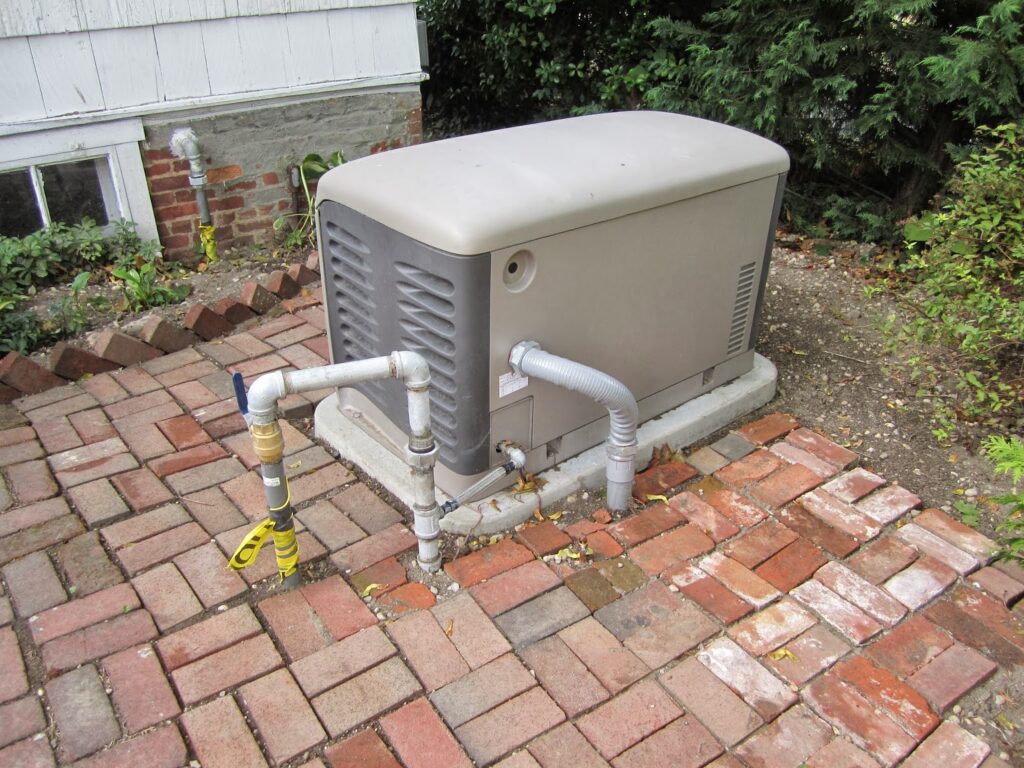
Advantages of Natural Gas
-
Directly piped from municipal supplies.
-
Produces fewer pollutants than oil-based fuels.
Considerations for Natural Gas
-
Installation requires certified professionals.
-
Vulnerable to disruptions during natural disasters.
Propane Generators
Propane offers high energy and storage longevity. It’s less reliant on continuous supply infrastructure.
Benefits of Propane
-
Dense energy content ensures longer run times.
-
Stable shelf life with proper tank maintenance.
Storage and Safety
-
Outdoor storage is mandatory for safety.
-
Inspections prevent leaks and ensure operation integrity.
Diesel Generators
Diesel excels in efficiency, especially under strain. It’s reliable over extended periods, making it ideal for emergencies.
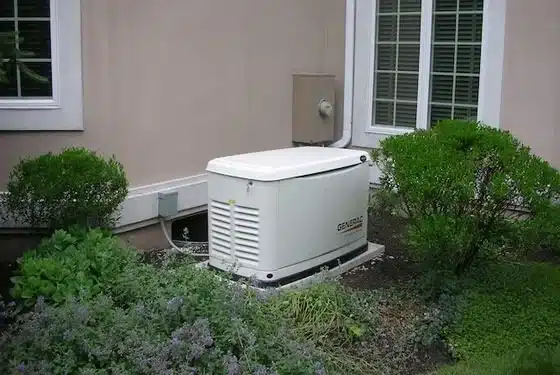
Why Diesel?
-
Handles sustained loads with ease.
-
Fuel economy surpasses gasoline alternatives.
Maintenance and Efficiency
-
Regular upkeep prevents operational issues.
-
Performs best when running at full capacity.
Gasoline Generators
Gasoline is the most accessible generator fuel. Service stations provide easy refueling opportunities nationwide.
Accessibility of Gasoline
-
Available ubiquitously across regions.
-
Refueling mimics everyday vehicle practices.
Pros and Cons
Pros:
-
Quick start-up facilitates immediate use.
Cons:
-
Highly combustible nature demands caution.
Dual-Fuel Generators
Dual-fuel units adapt to varied fuel availabilities. They balance cost-effectiveness with practicality during shortages or price hikes.
Flexibility of Choice
Multiple fuels cater to user preferences. Users can switch based on current fuel prices or availability.
How They Work
Toggle between fuels like gasoline and propane effortlessly. These generators adapt seamlessly to market conditions or personal needs.
Comparing Fuel Types for Whole-House Generators
Choosing the right fuel for a whole-house generator involves considering availability, cost, and environmental impact. Storage requirements and power needs also play crucial roles in the selection process.
Availability and Accessibility
Fuels vary by region. Some areas have abundant natural gas, while others rely on propane or diesel. Infrastructure influences continuous supply, with local market prices impacting cost-effectiveness.
Cost-Effectiveness
Operating costs differ among fuel types. Efficiency ratings determine fuel consumption. Initial setup expenses are integral to overall affordability.
Emissions Impact
Carbon dioxide and nitrogen oxides emissions vary by fuel. Regulations may restrict certain fuels based on emissions standards. Renewable biofuels present environmentally friendlier options.
Shelf Life Storage
Propane boasts an indefinite shelf life when stored correctly. Diesel degrades over time without stabilizers. Gasoline demands regular rotation due to freshness concerns.
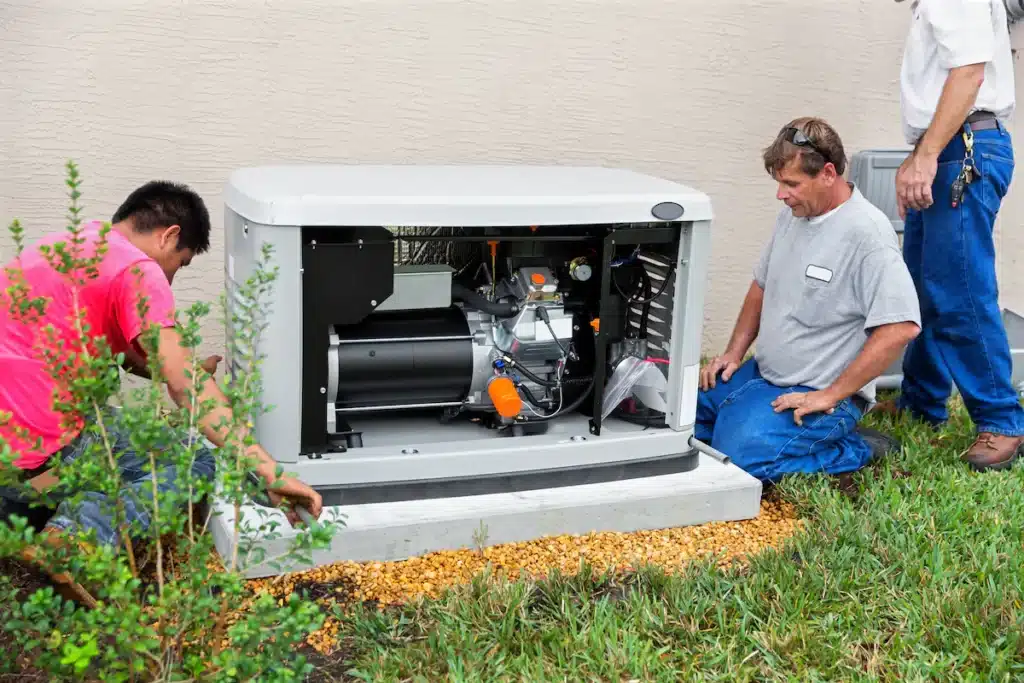
Power Needs Evaluation
Total wattage required by home systems must be calculated. Peak demand considerations influence generator size choice, avoiding unnecessary expense from overestimation.
Geographic Climate Factors
Cold climates necessitate specific generator features for optimal performance; coastal areas require corrosion-resistant materials; altitude can impair engine efficiency.
Local Infrastructure Reliability
The reliability of a community’s natural gas or electrical grid is significant, especially in rural versus urban settings where access to pipeline-supplied natural gas varies greatly.
Safety Compliance
Adhering to building codes and fire safety standards is mandatory for installation safety. Proper ventilation is essential to prevent carbon monoxide issues.
Ventilation Space Needs
Generators require space for safe operation and servicing along with adequate airflow for cooling purposes—placement factors in noise levels relative to living spaces.
Delivery Considerations
Onsite delivery feasibility depends on location specifics—bulk purchasing might offer savings; establishing supplier relationships ensures consistent supply continuity.
Permitting Requirements
Understanding zoning laws affecting property use is critical—certified electricians ensure installations meet local codes; non-compliance risks fines and legal complications.
Home System Integration
Compatibility with existing electrical and HVAC systems is necessary—smart generators should integrate smoothly without disrupting standard operations.
Maintenance Schedules
Regular maintenance like oil changes extends generator lifespan—inspections prevent corrosion while clean air intake systems maintain performance efficiency.
Wear and Tear Effects
Different fuels affect engine wear rates—quality lubricants minimize damage while routine checks detect early wear signs, potentially averting extensive repairs later on.
Long-Term Operational Costs
Lifetime costs include replacement parts and labor—energy-efficient models might incur higher upfront costs but save money long-term through reduced operational expenses.
Pros Cons Assessment
Balancing reliability against environmental concerns is key—as well as weighing immediate costs against long-term savings while prioritizing personal convenience versus accessibility considerations.
Consulting an Expert
Professionals tailor solutions to individual circumstances—they evaluate site conditions, recommending suitable sizes while ensuring industry best practice compliance through safety checks, embodying the champion services offered today.
Determining the Right Fuel Type for Your Home
Choosing the right fuel for a whole house generator involves understanding power needs and considering geographic, climate, and local infrastructure factors. Safety regulations and compliance are also crucial in this decision-making process.
Evaluating Power Needs
Identify your home’s energy requirements. This is essential to selecting a generator with the appropriate capacity. Examine your electricity bills or consult an electrician to determine peak usage. Consider which appliances are vital during an outage. These typically include refrigerators, heating systems, and medical equipment.
Geographic and Climate Considerations
Your location matters when choosing fuel types. In colder regions, propane might be a reliable choice for heating due to its lower freezing point compared to diesel. Conversely, natural gas could be more accessible in urban areas. Assess seasonal weather patterns too; areas prone to hurricanes may experience disrupted fuel supply chains.
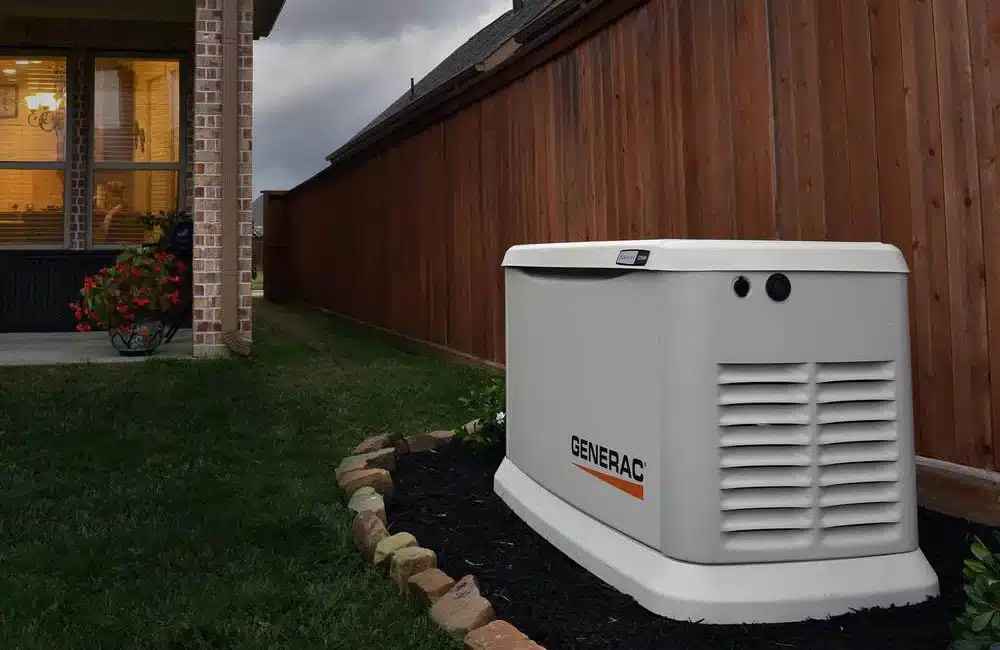
Fuel Availability and Local Infrastructure
Investigate local fuel accessibility before deciding on a portable or standby generator type, such as Generac, to ensure a reliable power source. Natural gas lines directly connected to homes offer convenience but aren’t available everywhere. Propane can be stored onsite but requires space for tanks. Diesel generators need regular refueling, posing challenges if suppliers are distant.
Safety and Regulatory Compliance
Safety is paramount when installing a whole house generator. Adhere strictly to Ogden, Utah local codes regarding fuel storage and generator placement for both portable generators and standby generators, ensuring reliable power and compliance with navigation (nav) regulations. Regulations often dictate minimum distances from buildings or property lines for certain fuels due to their flammability risks.
Installation Considerations for Different Fuel Types
Choosing the right fuel type for a whole house generator involves multiple factors. Space, delivery, legal compliance, and system integration are critical to consider.
Space and Ventilation
Whole house generators need proper space. This ensures safety and efficiency. Gasoline units often require less room than diesel counterparts. However, they need significant ventilation due to fumes. Natural gas models may fit in smaller areas but still demand airflow to prevent hazards.
Large generators can be bulky. They might take up more outdoor space. Always check local zoning laws before installation to ensure you have enough room.
Fuel Delivery and Storage
Fuel availability is essential for generator operation. Propane and diesel require on-site storage tanks. These tanks must be filled regularly by a professional service to ensure champion services today.
Natural gas connects directly to the home’s supply line; no storage is needed here. But during outages, if the natural gas supply is compromised, it could affect your generator’s functionality.
Propane offers longer shelf life compared to gasoline or diesel. It’s a good choice if you expect infrequent use with long periods of standby time.
Permitting and Code Compliance
Legal requirements vary by location. Some places demand specific permits for generator installation. Others enforce strict building codes related to fuel types used in residential areas.
Ensure you’re aware of these regulations before choosing your fuel source:
-
Check with local authorities about necessary permits.
-
Understand code restrictions around fuel storage.
-
Ensure that your installation contractor is familiar with these regulations too.
Failing to comply can lead to fines or removal orders.
Integration with Existing Home Systems
Your home’s current systems impact generator integration:
-
Electrical wiring must support the added load of a whole house generator.
-
For natural gas generators, existing gas lines should accommodate increased flow.
-
Smart home systems might require additional configuration for seamless operation during power outages.
Consider hiring professionals who specialize in integrating generators into homes like yours:
-
They can assess compatibility with your electrical panel and other systems.
-
Expertise ensures safe connection without risking damage or inefficiency.
Fuel Type Impact on Generator Maintenance and Longevity
The fuel type you choose for your whole-house generator significantly affects maintenance routines, the longevity of the unit, and the overall cost of operation. Adequate and timely maintenance ensures that your generator remains reliable when you need it most and extends its service life.
Routine Maintenance for Different Fuel Types
Natural Gas Generators require less maintenance than those that use liquid fuels. These units typically demand regular checks of the spark plugs, air filters, and oil changes. However, it’s essential to ensure that the gas lines are in impeccable condition to prevent leaks.
Propane Generators also have a relatively low maintenance requirement, similar to natural gas units. Inspections of the fuel lines and tanks for leaks and corrosion are critical. Propane, like natural gas, burns cleanly, which helps in reducing engine deposits and prolonging engine life.
Diesel Generators are built for endurance but require vigilant maintenance. Fuel filters and water separators must be checked and replaced regularly to prevent blockages and corrosion. Diesel fuel can also gel in cold temperatures, impacting the heating efficiency, which means additives may be necessary for colder climates to maintain proper heating performance.
Gasoline Generators frequently require carburetor cleaning and spark plug changes due to the characteristics of gasoline fuel. Standby generators, especially portable models for commercial use, often require stabilizers if the power unit is not run regularly, as gasoline can degrade and cause starting issues over time.
The Impact of Fuel Choice on Wear and Tear
Different fuels burn at different rates and conditions, influencing the wear and tear of generator components. Natural gas and propane burn cleaner and cooler, usually resulting in less stress on engine parts, whereas diesel and gasoline can run hotter and may lead to more frequent repairs and part replacements over time.
Operation Cost Over Time
The long-term costs of running a whole house generator vary by fuel type:
-
Gasoline: Often less expensive initially but can become costly due to frequent maintenance.
-
Diesel: Higher upfront cost; however, it offers better efficiency in large-scale applications.
-
Propane/Natural Gas: Lower maintenance costs but may have higher installation expenses due to required gas lines.
The efficiency of each fuel type also plays into overall cost-effectiveness:
-
Gasoline Generators typically have lower efficiency compared to others.
-
Diesel Units are more efficient under heavy loads.
-
Propane/Natural Gas Generators maintain consistent efficiency levels with cleaner burning properties.
Making an Informed Decision on Fuel Types
When choosing a whole-house generator, selecting the right fuel type is pivotal, especially if it needs to integrate seamlessly with your home’s furnace. It will influence not only the initial setup but also the long-term operation and maintenance of your system. Decisions regarding fuel types should be made with consideration of your specific needs, location, and budget.
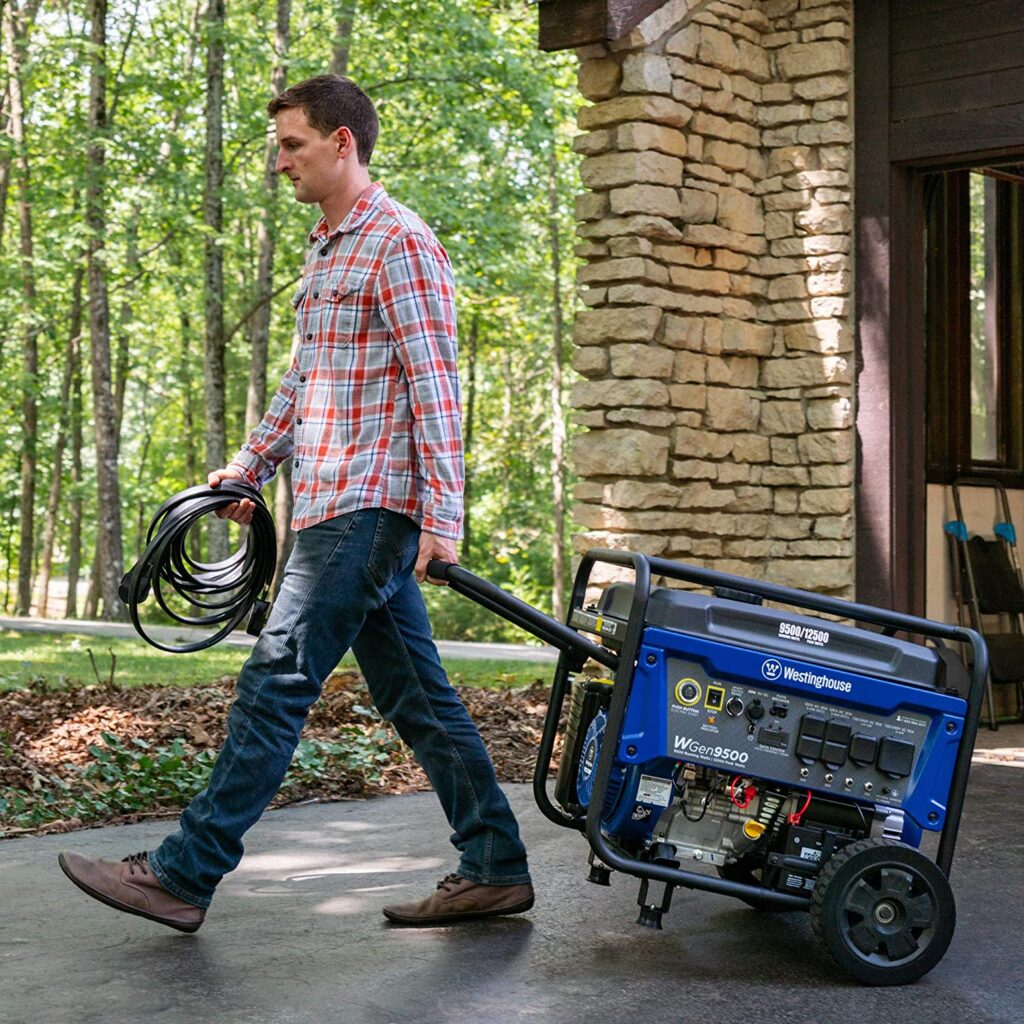
Assessing Pros and Cons
Natural gas, propane, diesel, and gasoline are common fuels for whole house generators. Each has unique advantages and limitations.
Natural Gas:
Provided through pipelines, this fuel option is convenient if your home is already connected to a municipal gas line. It’s one of the cleanest burning fossil fuels and provides an uninterrupted supply. However, its availability depends on the local infrastructure, and it may be unusable during some natural disasters that disrupt gas lines.
-
Pros: Widely available, continuous supply line, low emissions.
-
Cons: Less energy-dense than other fuels, requires gas lines installation.
Propane:
Like natural gas, propane burns cleanly but requires on-site storage tanks, which can be refilled by local suppliers. This fuel has a long shelf life, making it suitable for areas with less frequent power outages. Tanks have specific placement regulations and represent an additional cost for installation and maintenance.
-
Pros: Long shelf-life, more energy per gallon than natural gas.
-
Cons: Requires storage tank, potential for leaks.
Diesel:
Known for reliability and efficiency, diesel generators are great for emergency power. Diesel fuel has a great shelf life and is easier to store than gasoline, but it can be more expensive and its engines often run louder. Plus, diesel engines may require rigorous maintenance routines.
-
Pros: High energy density, reliable in cold weather.
-
Cons: Periodic maintenance needed, higher emissions than gas or propane.
Gasoline:
Although commonly available, gasoline’s high volatility and shorter shelf life make it a less practical choice for standby generators. Gasoline units require frequent refueling, especially during prolonged outages, and price fluctuations are, at times, quite significant.
-
Pros: Easily accessible at service stations.
-
Cons: Short shelf-life, highly flammable.
The Role of Professional Consultation
Navigating the complex landscape of fuel types, power requirements, and generator models can be daunting. That’s why a consultation with a generator professional is invaluable, whether you’re considering standby generators, portable units, or power solutions for your RV. They will assess your power demands, local fuel availability, safety codes, and environmental considerations to recommend an optimal solution. A professional can also advise on generator placement, permits needed, and provide an installation plan tailored to your property.
Experts provide:
-
Customized recommendations
-
Installation guidance
-
Safety protocols
-
Maintenance tips
A certified technician ensures the chosen fuel matches with generator specifications and local regulations.
Considering Future Fuel Trends
The future of backup power is steering towards more sustainable options. Innovations like generators that can integrate with solar systems or those designed to be compatible with renewable natural gas (RNG) are on the rise. It is also becoming more common to see generators with smart features for monitoring fuel consumption and efficiency. Keep these innovations in mind as they can future-proof your investment and may offer a greener footprint and potential cost savings down the line.
Current trends show:
-
Increasing interest in eco-friendly options
-
Research into longer-lasting fuel cells
-
Development of more efficient generators
Adapting to these changes can lead to cost savings and environmental benefits over time.
FAQ Section
What fuel options are available for whole-house generators?
Whole-house generators typically run on a variety of fuels such as natural gas, propane, diesel, and less commonly, gasoline. There are also models that can operate on more than one type of fuel, known as dual-fuel or bi-fuel generators.
How do I determine which fuel type is best for my whole-house generator?
The best fuel type for your whole-house generator depends on factors such as the availability of the fuel in your area, storage possibilities, cost, and the specific needs of your home. Natural gas is a good choice if you have a reliable supply line, while propane is ideal for areas where natural gas is not available. Diesel is known for its efficiency and long shelf life, making it suitable for infrequent but critical use.
Are there any environmental considerations when choosing a fuel type for my generator?
Yes, fuel types differ in their environmental impact. Natural gas burns cleaner than diesel or gasoline, producing fewer emissions. Propane also has a relatively low environmental impact. However, renewable energy advancements are influencing generator technology, and future options may offer even greener alternatives.
Is it possible to switch fuel types after installing a whole-house generator?
Typically, generators are designed to operate on a specific fuel type, so switching fuels is not common. However, some dual-fuel generators allow switching between natural gas and propane. Converting a generator to a different fuel type should only be done by professionals and may not be supported or safe for all models.
What are the advantages and disadvantages of using propane for my whole-house generator?
Propane has the advantage of a long shelf life without degradation and is available in areas without natural gas lines. It’s also cleaner-burning than gasoline or diesel. However, propane requires a storage tank, and its cost can fluctuate more than natural gas.
How do the maintenance requirements differ among fuel types for whole-house generators?
Maintenance varies by fuel type. Diesel engines may require more frequent oil and filter changes due to their design, while natural gas and propane generators typically have less intensive maintenance schedules. Gasoline generators may require more frequent maintenance due to the volatility of the fuel.
Does the fuel type affect the noise level of the generator?
The noise level of a generator is more closely related to the generator’s design and insulation than the fuel type. However, diesel engines may run louder than natural gas or propane engines. It’s important to consider the generator’s specifications for noise level rather than the fuel type alone.
Can I have a backup fuel option in case my primary fuel source is unavailable?
Yes, if you anticipate potential interruptions in your primary fuel supply, you can choose a dual-fuel generator that allows you to switch between two types of fuel, such as natural gas and propane.
How does fuel storage safety differ among fuel types for generators?
Each fuel type has specific storage safety requirements. Natural gas is supplied via pipelines and does not require on-site storage. Propane is stored in tanks that have strict placement and maintenance regulations. Diesel and gasoline require proper containers and well-ventilated, cool, and dry storage areas away from living spaces due to their flammability and potential for degradation.
How will the choice of fuel type for my whole-house generator impact installation costs?
Installation costs can vary significantly depending on the fuel type. Natural gas generators may require less expensive installation if you already have a gas line in your home. Propane and diesel generators may require additional costs for storage tanks and their installation. Always consult with a professional to get an accurate estimate for your specific situation.

